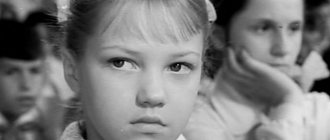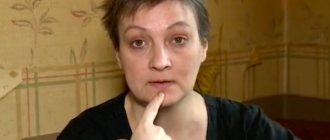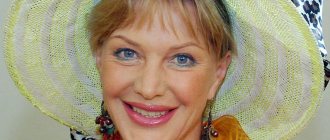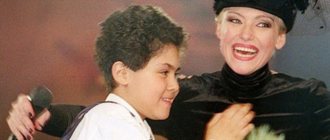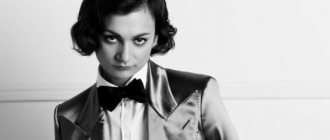Childhood, family
Obraztsova Elena Vasilievna was born in Leningrad on July 7, 1939. Dad - Vasily Alekseevich, mother - Natalia Ivanovna. Elena Obraztsova, whose biography is connected with the harsh years of the war, experienced all the horrors of this time. She associates all her childhood memories with the blockade. In the very first days of that terrible war, my father went to fight at the front. Until the end of 1942, little Lena with her mother and grandmother remained in the besieged city. Only in the spring they were evacuated to the Vologda region, to the city of Ustyuzhna, where they lived until the summer of 1945.
After the end of the war, my father returned from the front only a year later. Life was very difficult. Mom got a job and sent Lena to kindergarten. The music director was the first to notice the girl’s unusual and strong voice and immediately told her mother about it, but she was so busy with everyday problems that she did not attach any importance to her words.
Lena started singing very early. Already at the age of five, parents and neighbors listened to “concerts” performed by the girl. She had a very thin, mosquito-like voice. She sang everything she could hear on the radio. Basically, these were Strauss waltzes. When Lena grew up and started going to school, she always did her homework while listening to music. During opera broadcasts, she sat for hours at the loudspeaker. For the future opera diva, music was not an addition to life, but its main part.
She always remembered family musical evenings. Elena's father had an unusually beautiful baritone voice and played the violin well. For work, he often traveled abroad and once brought several records from Italy, from which Lena studied the voices of great singers - Caruso, Gigli, Galli-Curci.
Taganrog
In 1954, Elena's father was transferred to work in Taganrog. This city gave the aspiring actress a meeting with the excellent teacher A.T. Kulikova. Lena studied vocals with her for two years. She took part in school concerts with pleasure - she sang famous romances and songs popular at that time from the repertoire of the famous Lolita Torres. On the stage of the theater. Chekhov organized reporting concerts. Once, at one of them, the girl was noticed by the director of a music school from Rostov-on-Don, Mankovskaya. She advised her to continue her education.
In 1957, Elena was accepted into the school immediately as a second year student. In August 1958, E. Obraztsova passed an audition and was accepted into the preparatory department of the Leningrad Conservatory. More than a hundred people applied for admission, of whom only three applicants were accepted, among whom was Elena Obraztsova.
She took a course with Professor Antonina Grigorieva, a wise and very patient specialist. As Obraztsova, whose photo you see in this article, recalls, she always wanted to immediately sing big arias, complex and unusually beautiful romances, but Antonina Andreevna convinced that it was impossible to sing without learning the basics of vocals.
First awards
Elena Obraztsova, whose biography was already inextricably linked with the theater, in 1962 received two gold medals at once at the youth festival in Helsinki and at the vocal competition. Glinka in Moscow. From that moment on, the career of the aspiring artist began to develop rapidly. Opera singer Elena Obraztsova received an invitation to join the Bolshoi Theater troupe. Her debut on the stage of the legendary theater took place on December 17, 1963 in the opera “Boris Godunov”. It was at this time that the decision was made to graduate from the conservatory as an external student.
On May 11, 1964, in the Glazunov Hall, Elena Obraztsova passed the final exam, in which S.P. Preobrazhenskaya gave Elena a grade of “five plus,” which no one at the Leningrad Conservatory had received for the last forty years.
Elena Obraztsova: biography, beginning of career
In the same year, the singer went on her first tour to Japan as part of the Bolshoi Theater troupe, and in the fall to Italy. She performed on the famous stage of La Scala Theatre. Her roles were small - Princess Marya (War and Peace) and governess in The Queen of Spades. In the very first year of work at the Obraztsova Theater, Elena Vasilyevna performed eight (!) roles, thereby making the whole musical Moscow talk about herself. In a very short time, the name of the rising star shone on the world opera horizon. The tour to Paris in 1969 became especially significant for the young opera singer. The resounding success in the role of Marina Mniszech radically changed her creative destiny.
In 1970, she received gold medals at the Tchaikovsky Competition in Moscow and in Barcelona at the Tchaikovsky Competition. F. Vinyasa. In 1971, in Paris, at the Pleyel concert hall, opera lovers were presented with her first solo concert, which French journalists called “historic.” Following Paris, the largest cities and capitals of the world recognized that Elena Obraztsova is a singer who is one of the most brilliant opera stars in the world. Her performances on famous stages have gone down in the history of opera. She managed to raise the Russian vocal school to unprecedented heights.
Elena Obraztsova: “When love bursts into life, it’s amazing”
On July 7, 2020, she could have turned 80 years old, but she did not live to see the anniversary. At the very beginning of 2020, Elena Vasilyevna Obraztsova passed away. Great. Unique. The only one. What kind of epithets did the journalists bestow upon her fans! But her talent was greater than the most powerful words.
This interview of Elena Obraztsova with a Svoboda correspondent was one of the last. - Blockade, war... Such an experience could not pass without a trace for you? It is inevitably imprinted in any biography.
– Even before the blockade began, I had another shock that significantly affected my entire subsequent life: when I was two years old, a rooster pecked me in the yard at the dacha! So to this day I consider this the greatest sign in my biography. And so much has already been said about the blockade that I would not return to this difficult topic now. Yes, we saw a lot of terrible things, hunger, corpses of people on the streets of Leningrad, but in the end my parents managed to take me to evacuation in one of the last cars from the besieged city.
– When did you first feel connected to music?
My entire childhood was spent listening to my father’s records, which he brought from Italy in 1937.
– At the age of five, when I first watched the film “The Great Waltz” about the life of Johann Strauss. I immediately decided that I also wanted to sing, like the heroine of the film, singer Carla Donner, played by Milica Korjus, that I would be just as beautiful, and my husband would also be no worse. Then I fell in love with Lolita Torres in the film "Age of Love." These two women made a completely indelible impression on me as a child. But in general, my entire childhood was lived listening to my father’s records, which he brought from Italy in 1937. And I remember when we returned to Leningrad from evacuation and our apartment was occupied by strangers, we were forced to buy from them our own furniture and things, but most importantly, this huge red morocco album with records, which played such an important role in my life. And the neighbors often complained to my parents about me, saying that “this Lyalka” (my childhood name was Lyalka) again did her homework to music.
– Was your family somehow connected with music?
“Dad played the violin and sang wonderfully. Just like his brother. But he had a different profession, an engineer. And my mother was a designer.
– But your father was against entering the conservatory. Why?
“Dad said that if I became a singer, I would “disgrace our family” and “I would sing in the cinema before film shows.”
- But in the end, did dad appreciate your talent?
– He didn’t talk too much about this topic. But I remember when I returned as a winner from a competition for young performers, there was a poster “Hello to the laureate!” hung above the piano at home, written by my dad. I won't lie, it was nice.
– But having a voice is not everything for a singer. What other qualities are needed for him?
When you go on stage, you have to know what exactly you want to tell people.
– If someone gave me a Stradivarius violin, I wouldn’t know what to do with it. And I certainly couldn't play it. So it is with this gift from God, given to us from above: before you really become someone, you must carefully polish your voice, work terribly hard on your instrument in order to make something worthwhile out of it. Yes, it is very important to master the technique of singing, but in addition, you need to receive a fundamental musical education, study literature, painting and much more. But the most important thing is that when you go on stage, you must know what exactly you want to tell people.
– Do you remember what you did? What did you sing during the exam?
“I remember that I was terribly annoying to the admissions committee with my singing.” First she sang an aria and, not seeing much reaction on their faces, she sang another song, and then a folk song. In the end, I couldn’t stand it anymore and asked the admissions committee to evaluate my “voice range.” At this point everyone started laughing, and I realized that they probably liked it.
– Let’s remember your first experiences in the West.
– I began to travel abroad with the Bolshoi Theater, where at first I sang small parts. For example, the role of the Governess from The Queen of Spades at La Scala. But one day, in 1974, Irina Arkhipova, who performed the role of Marina Mnishek in Boris Godunov, was unable to go on tour to the Grand Opera. Instead, I sang and instantly became famous, the Parisian press began to write about me, and my photographs adorned all the newspapers and magazines. Thanks to this, a few months later I was already singing in Il Trovatore at the opening of the season at the San Francisco Opera, where my partners were Luciano Pavarotti and Joan Sutherland. But the most important moment of recognition was the invitation to the Grand Opera of Solomon Hurok himself, one of the most serious managers of our time. Of course, I will never forget singing Werther at La Scala and my triumphant debut at the Metropolitan Opera in Aida. These steps into big music became decisive for me.
– Tell us about your meeting with director Franco Zeffirelli when you starred in his production of the opera “Honor Rusticana” as Santuzzi. I can’t help but remember his words about you: “There have been three shocks in my life: Anna Magnani, Maria Callas and Elena Obraztsova, who created a miracle during the filming of the film “Rural Honor.”
– We first met him in New York. Placido Domingo introduced us, and I remember that I was very worried before this meeting. He lived in a huge hotel, at the very top, in a large attic. And when we walked in, the first thing I saw was Franco’s dog. I love animals very much, so they often catch my eye before their owners. She was a wonderful fawn color, similar to a setter, but only all naked and with fantastic blue eyes. And when I looked at Zeffirelli himself, I saw that his eyes were exactly the same. And he himself suddenly shouted: “Stay there! Do not move!" I was even taken aback by the answer. The answer was unexpected: “You are a copy of my mother! Stay where you are, I’ll look at you again.” Since then, we have become very good friends, and he often sends me congratulatory letters on various occasions, which makes me very happy and really proud.
Franco Zeffirelli (1923–2019)
– I can’t help but ask you about the meeting with your second husband, conductor Algis Juraitis. Was it difficult to decide to divorce? Was he really as ascetic, reserved, and aloof as he seemed to many? I remember numerous stories about his interests in yoga, vegetarianism, etc.
– Everything was very difficult. First of all, I loved my first husband terribly. He was a theoretical physicist, a very smart, intelligent, well-mannered man. And in general, divorce was absolutely not accepted in our family. And Algis was a very great friend of our family for many years, he visited us often. At the same time, neither he courted me, nor did it occur to me to flirt with him. It all happened somehow suddenly, in one second, as if struck in the back by a lightning strike. As for Algis’s restraint, yes, he even once wanted to go to a monastery. But there was one smart monk who told him that “we do not choose the monastery, but the monastery chooses us.” In a word, Algis was ordered to return to his real work, and leave God’s work to God.
– I heard that after (or during) the divorce you even began to lose your voice from stress?
“I didn’t lose my voice, I just started singing poorly at some point.” I was really very worried then, including for Lenka (singer Elena Makarova, daughter of E.V. Obraztsova from her first marriage to Vyacheslav Makarov - S.K.), who at that time had to go to university. For her part, she also kept trying to protect me from stress, although she was the first to notice: “Mom, don’t you see that Juraitis is in love with you?”
– But Lena herself was very worried about your divorce and you even had some long-term difficulties in your relationship?
- Yes, they were. And only relatively recently, after two of her own divorces, she began to understand me a little better. But in general, when love bursts into life, nothing can be done about it. This is amok.
– In relationships with your loved ones, do you prefer to remain gentle and tolerant? Don't put pressure on them, which often happens with women as strong by nature as you?
- In no case! When Lenka decided to follow her husband to Spain for fifteen years, it was a tragedy for me. But I said: “Lena, you must act as you feel, as you hear. The Lord gives each of us our own life, and you must live it yourself.” Indeed, you should never interfere in the lives of your loved ones.
Elena Obraztsova, 1979
– What is this dramatic story with Montserrat Caballe, who once knelt before you? And the same thing seems to have happened to you and her?
I did it out of delight, and she, I think, out of a sense of humor
“Once she amazingly sang Verdi’s “Sicilian Vespers” at the Liceo Opera House in Barcelona. It was so beautiful that she immediately ran to her, fell to her knees and said: “I never thought that you could sing so purely and perfectly live.” And the next day I myself sang “Carmen” with Domingo. And in response, she also came running and fell on her knees in front of me. But I did it out of delight, and she, I think, out of a sense of humor. So I said that, probably, now we need to call a jack to put her back on her feet. But since she really has everything in order with humor, from then on we became friends for life. And she is truly an outstanding singer, God kissed her generously.
- Let's talk about home. How important is it to you? And can you feel at home living, for example, in Milan, Rome, Paris?
Over time, this need for solitude turned into some kind of madness for me.
– Home is very important to me, because all my life I have traveled all over the world. I didn’t have a house, an apartment, or a corner where I could lock myself in and be alone. Over time, this need for solitude turned into some kind of madness for me. It’s just that at a certain moment it starts to get terribly scary that you’ll spend your whole life on planes, buses, trains... I got my first apartment from the Bolshoi Theater right when I was giving birth to Lenka. I remember that it seemed like a palace to me then. There was a thirteen-meter room and a corresponding kitchenette, but I was happy. Since then, the feeling of home has remained very important to me, as are all the little things that fill it. In my opinion, these toys are simply driving me out of the house. Perhaps such an attachment to them appeared due to the fact that I did not have toys as a child. In addition, I have four dogs. And when Lenka arrives with her two children, then complete happiness sets in! Sashka, the eldest grandson, is already twenty, and he is two meters tall. And the youngest, Elia, is still very small.
And it’s also important that I always associate the house with Moscow. The more I travel around the world, the more I feel Russian. When I see these unfortunate grandmothers somewhere in my Patriarchal, I get the feeling that I know everything about them, and my heart bleeds. It pours out in the same way when I look at these visiting boys from somewhere in Central Asia and understand how sad their life is here with us. Western people (and I have a huge number of friends among them) are still not at all like us. You can, of course, fall in love with beautiful Italy, strive to find a second spiritual homeland there, but for me I can only live in Russia. I can't imagine myself anywhere else in the world.
– Are you afraid of age? Are you afraid of old age? And does it even exist? Or is she just our illusion, the embodiment of some of our own fears?
I remember all the books I read, and the music I listened to, the animals that I managed to save and raise.
– I have no fear of old age, I’m already old. The only thing you can regret here is that the years take away your health. And I love this age of mine, it brings wisdom. All the experience I gained through learning about the world, some life situations, and communicating with people is important to me. I remember all the books I read, and the music I listened to, the animals that I managed to save and raise. Thanks to all this, inner peace and a philosophical attitude towards life came to me. True, it’s a pity sometimes to think that you’ll soon die...
– Theater, including opera, presupposes some kind of not just strict discipline, but sometimes even breaking, internal violence on the part of the director. Have you ever had to endure something similar?
– It’s even funny for me to hear about this now! Yes, at first I had a lot of clashes with directors, but then, when I grew wiser, I said to myself: “We must always say yes to them, but do it in our own way.” And if they made any complaints against me, I simply pretended that I had forgotten “their wishes.” It seems to me that you should always strive to express yourself, and not what the director wants. Otherwise, why am I, one wonders, on stage?!
– But were there any cases of any outright conflicts?
– There was a very funny incident when a French director staged “Carmen” with me in Marseille. By the way, we also sang there with Placido Domingo. So, the director kept making me clean my claws with a knife, naturally depicting life in the mountains. At the same time, I tried to remind him that, in fact, we are not in the mountains, like Prosper Merimee, but on stage, and that doing this here is disgraceful and in bad taste. And then I was skinny, skinny, and for the sake of respectability they would hook up my petticoat. So, the director was always looking for something to find fault with me. As a result, at the dress rehearsal, where all the local press was present, he suddenly stopped the orchestra and yelled at me from the audience. But at the general meeting he is obliged to remain silent! At best, he can write down his comments in a notebook. And he screamed at the top of his lungs: “Dove vostra sotta gonna?!” Where is your petticoat?!” And then I couldn’t restrain myself and lifted my skirt on stage! As a result, the next day all the newspapers came out with Carmen with her skirt lifted on stage. But after the premiere, I came home with a huge armful of flowers, among which was a wonderful basket, and in it a note from the ill-fated director: “I’m at your feet!”
The worst stage vice I know is unprofessionalism
There was also a funny incident in Germany, where I came to sing “Aida.” I don't know German. During the rehearsal, the director kept trying to explain something to me in German and asked: “Fershtehe? Understand?" I answer that I understand, but I myself thought: “What new can he tell me about “Aida,” which I’ve already sung a hundred times without him?” As a result, I sing the famous scene of the curse to the priests and fall. There is thunderous silence in the hall, although I know for sure that I sang great. In principle, I always knew when I sang badly and when I sang well. In a word, my heart began to beat so much in alarm that, I think, it could be heard even in the hall. I open my eyes, and there I can see the boots of my partner, who sang the role of Radamès, the famous tenor Carlo Bergonzi. It turns out that the director wanted me to simply run away after the scene with the priests and not fall, because there was no change of scenery. And throughout the next scene I was forced to crawl in front of the audience, depicting hellish suffering. Thank God, in the end I finally found a suitable place for myself, stood up and sang a farewell phrase.
- It is known that the stage provokes many vices in people. One of the worst of them is envy. Have you ever had to defend yourself from it? – Envy has never bothered me. As well as jealousy. Moreover, I never thought about them. The worst stage vice I know is unprofessionalism. It's terrible when you find yourself on stage next to a professional cripple. – All your life you have loved experiments, often to the point of hooliganism. What does this experience of falling out of habitual behavioral stereotypes and frameworks give you? Does this kind of experiment include, for example, working with director Roman Viktyuk?
Chernyakov is indeed very smart, which only aggravates his guilt towards opera
“Viktyuk simply saved me then; I suffered a lot when Algis died. Then I was literally forcibly dragged to Viktyuk’s performance “Salome”. And then I came backstage and asked Roman if he wanted to work with me too. He said: “I’ll think about it.” And two weeks later he came to my house with almost his entire troupe, and a reading of the play “Antonio von Elba” by R. Mainardi began. After finishing the reading, my only question was: “When do we start rehearsing?” Viktyuk was terribly surprised that I didn’t ask him about the fee. It was these Viktyuk boys who saved me from my grief. And then the same Viktyuk invited me to the Satire Theater, offering to play in a play based on A. Nikolai’s play “Requiem for Radames.” This is a story about three actresses who found themselves in the house of stage veterans and, thanks to general conversations, suddenly discovered that they were in love with the same person, a certain Radames. There is bitterness, suffering, and loneliness... In addition, I had the pleasure of singing classical jazz (D. Ellington, V. Duke, J. Gershwin) with the quartet of Igor Butman and Denis Matsuev, which was called “Jazz for Three”. Unfortunately, I abandoned all this, because at some point I realized: in order to sing jazz, you need to know something else, have some other experience that I don’t have.
- What happened to another project that Viktyuk planned to stage with you - “Venus in Fur” based on the famous novel by Leopold von Sacher-Masoch? “He started rehearsing this play with me, and therefore somehow suddenly suddenly cooled down to it. I don’t remember what happened then - either he had to leave somewhere, or another play urgently turned up. And this despite the fact that I already managed to visit a sex shop in New York, buying a bunch of personal belongings there for the future performance. And then for a long time I didn’t know what to do with them, and in the end I put them in the bathtub at the dacha - to scare the guests. – How do you like the current newfangled experiments on the opera stage?
You should never squeak, complain, or blame someone
– I already tried to work with Dmitry Chernyakov once in his production of Ruslan and Lyudmila at the Bolshoi Theater, where I was supposed to sing the part of Naina. Our romance didn’t work out then, but in general, we became friends. He is a very smart and very knowledgeable person, and this makes his personal tragedy as an author even greater. For example, why put naked women on stage in “Ruslan and Lyudmila”? You can go to other places for such simple entertainment. The purpose of this can only be one - to shock the working people, who are susceptible to such simple, in general, nasty things. This is the secret of the current “box office” performances. The problem is that Chernyakov is really very smart, which only aggravates his guilt towards the opera. I think it's a sin. As for Vasily Barkhatov, I listened to his production of Strauss’s Die Fledermaus at the Bolshoi Theater. I got the impression that he is trying to combine politics with music, and this is absolutely unnecessary. Although at one time his production at the Mariinsky Theater of “Jenufa” by Leos Janacek (he was just starting out then) impressed me.
– In your interviews, you have said more than once that every day you pass an exam to the Lord God. Do you really have such an intimate relationship with him?
- In any case, I understand that all those hardships and suffering that are given to me by the Lord happen in my life for a reason. And you should never squeak, complain, or blame someone, but you should tell Him: “Thank you for giving just this.”
Obraztsova – teacher
From 1973 to 1994, the famous singer taught at the Conservatory. Tchaikovsky in Moscow. Since 1992, he has been teaching at the Musashino Academy in Tokyo and giving unique master classes in Russia, Europe, and Japan. Quite often today, the famous singer is invited to serve on the jury of international vocal competitions - Tchaikovsky in Moscow (1994), vocalists in Marseille (1997), Rimsky-Korsakov in St. Petersburg (1998). In 1996, Elena Obraztsova, a world-famous singer, created a Cultural Center in St. Petersburg.
Death
In 2014, doctors diagnosed Obraztsova with a malignant disease of the circulatory system – leukemia. A difficult period of treatment began in Germany. A donor was found and Elena Vasilyevna received a bone marrow transplant. But age and a weakened body did not allow the operation to produce a positive result.
On January 12, 2020, Elena Obraztsova passed away. This happened in Leipzig, where she was undergoing treatment. On January 14, the coffin with the body was delivered to her homeland, and a farewell to the great singer was held at the Bolshoi Theater. She was buried in Moscow at the Novodevichy cemetery.
Elena Obraztsova: personal life
V.P. Makarov is a well-known theoretical physicist in scientific circles. Little is known about him. A scientist of this level serves science, not people. This is Obraztsova’s first husband. Their marriage lasted 17 years. All this time, the husband looked after the house, took care of his daughter Lena, who was born in this marriage, and waited for his wife after a long tour. Elena Vasilievna remembers him with respect and warmth, but does not regret that she fell in love with another person. During the divorce, she lost her voice due to stress, and she could not sing at all.
Obraztsova met her second husband on stage. This is the famous Lithuanian and Russian conductor Algis Marcelovich Juraitis. He never complained about his health. A terrible, insidious disease burned him unexpectedly and cruelly. At first, Elena Yakovlevna did not understand well what had happened. She rushed around countries and cities, diligently avoiding home, where everything reminded her of her beloved. Elena Obraztsova, whose biography until then had been developing happily, suffered a severe blow. She drove away dark thoughts from herself, but she did not have enough strength to continue living. In addition, during this difficult time, daughter Elena and her family left for Spain to study vocals, and took her grandson with her. The desperate woman gained weight, her voice lost its unique beauty. Elena Vasilyevna fell into a deep depression, from which her friends helped her get out.
Today, Elena Obraztsova’s family consists of daughter Elena (also an opera singer), grandson Alexander and granddaughter Anastasia.
Personal life
Obraztsova's first husband was theoretical physicist Vyacheslav Makarov. In 1966, the couple had a girl, Lena.
Obraztsova’s constant tours led to a divorce, the girl remained to live with her dad, for some time she was offended by her mother and even addressed her by name and patronymic. But as an adult, Lena changed her mind and forgave her mother. The daughter first studied to be a journalist, then to become a doctor, but as a result she graduated from the conservatory, performs small opera roles, and was taught vocals by Montserrat Caballe herself.
The second husband, Algis Zhuraitis, was a conductor at the Bolshoi Theater. He died in 1998, this death was a severe blow for Obraztsova. But Elena always knew how to withstand the vicissitudes of fate, and she also withstood the loss of her husband.
